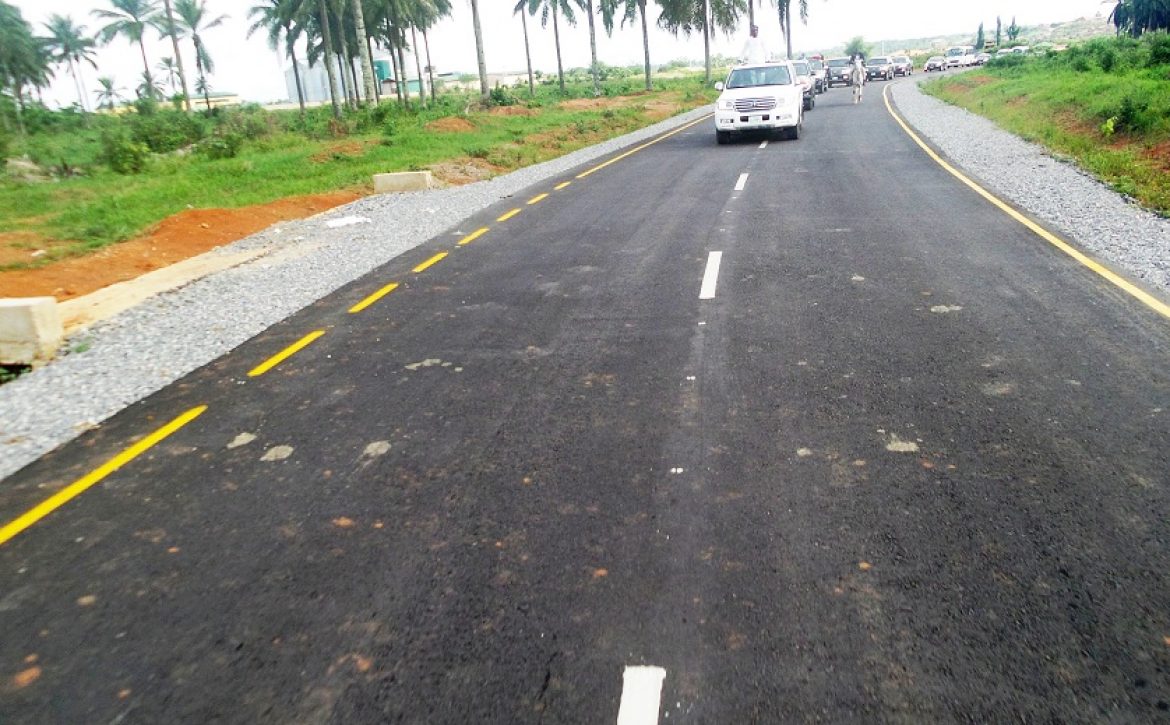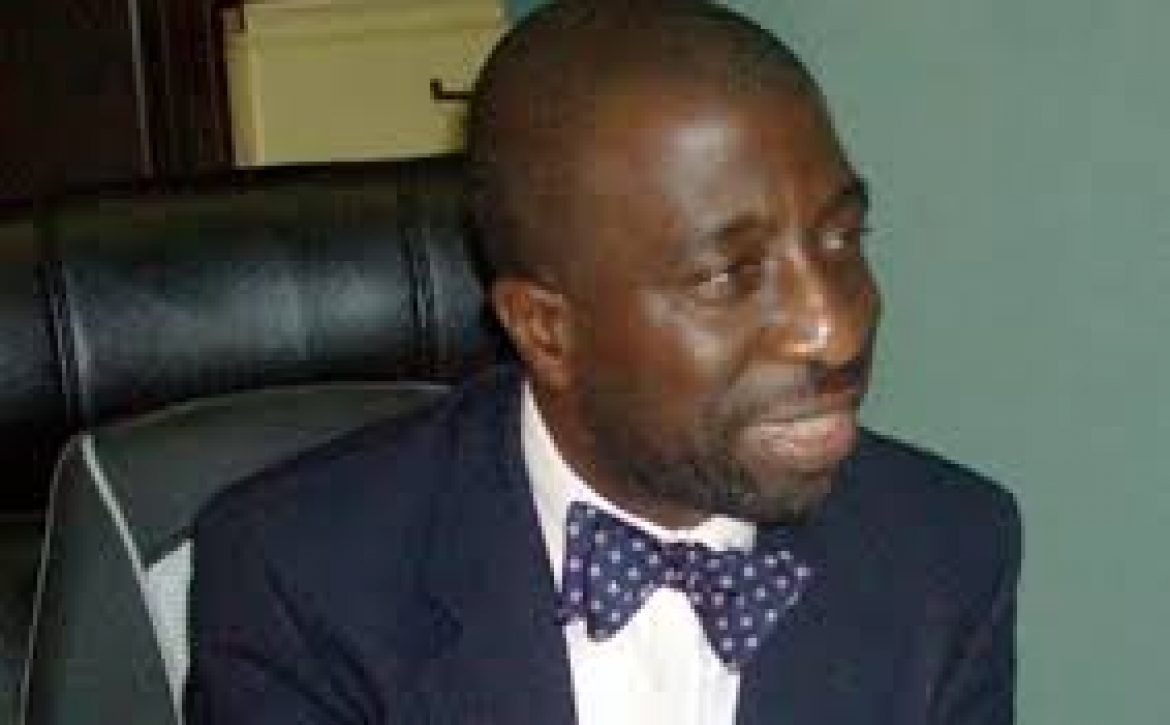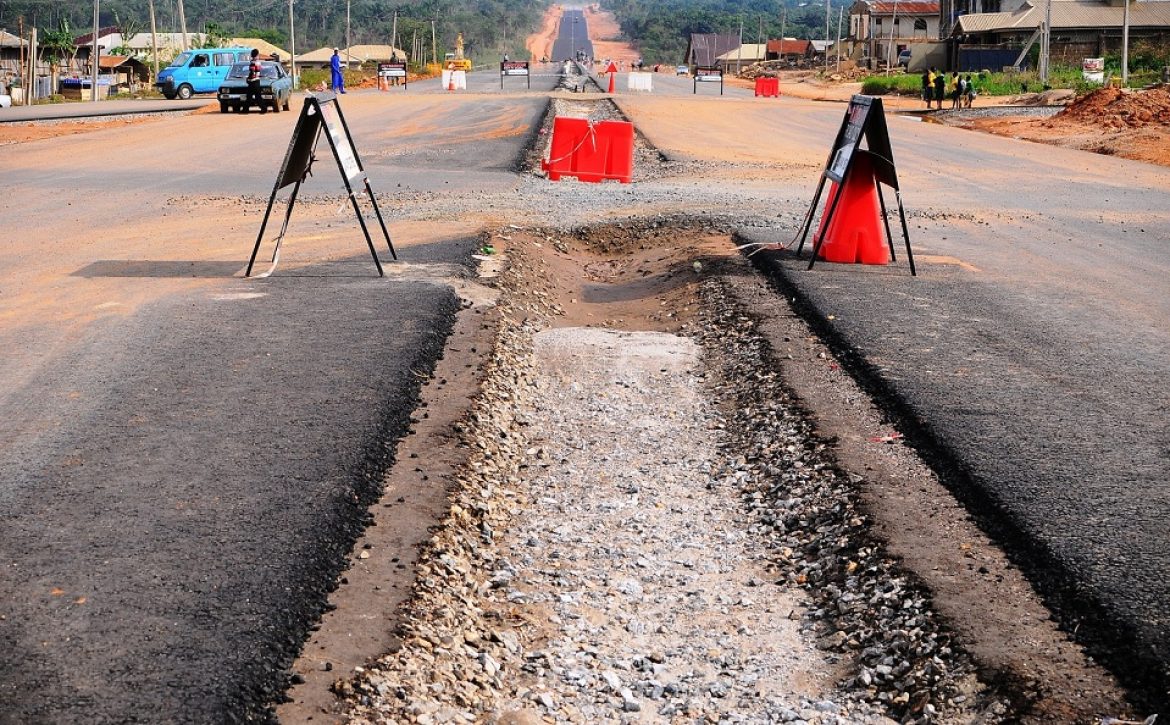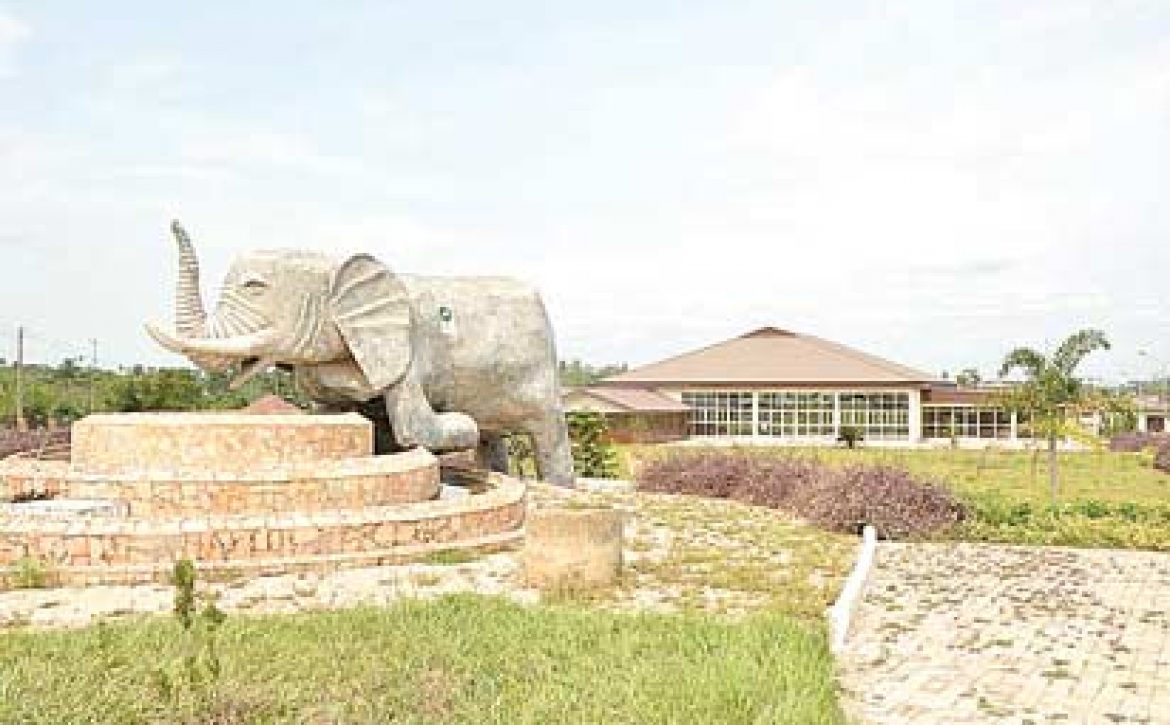 Founding fathers of Osun State are set to form a broad-based task force committee on the forth-coming governorship election.
Founding fathers of Osun State are set to form a broad-based task force committee on the forth-coming governorship election.
A statement by the Chairman of Osun Founding Fathers Movement, Amb Diran Fagbongbe said the committee will serve as a link among all the political parties, ensure peace prevails before, during and after the election.
According to him, the committee will also ensure that the best candidate emerge as the next governor .
“The committee will include all the surviving founding fathers of state, along with all the surviving traditional rulers who joined forces ro ensure the creation of the state on August 27, 1991, some newly installed Obas and chairmen and other top political chieftains. Also some powerful spiritualist and clerics of traditional, christian and muslims, faiths will also be invited to join them” Fagbongbe explained.
THE NATION
Category: News
 Osun State Governor, Rauf Aregbesola, has disclosed that his administration has approved the tarring of Igbajo/Ada road in its bid to enhance movement of farm produce to commercial centres in the state.
Osun State Governor, Rauf Aregbesola, has disclosed that his administration has approved the tarring of Igbajo/Ada road in its bid to enhance movement of farm produce to commercial centres in the state.
He stated this at the 27th Igbajo Day celebration held at Baptist Elementary School Igbajo.
The governor, who was represented by his Deputy, Mrs. Grace Titi Laoye-Tomori, said his administration is focused on enhancing inter-communal peace impacting positively on all communities in the state.
He, however, charged the indigenes and residents of the community that government alone cannot endear development in all the communities in the state, hence, the need for partnership with various communities’ development associations to stimulate development and progress.
“Development goals require our individual and collective involvement. They demand that we come together and map out means of fulfilling them. In so doing, we become not only partners in progress minding the same thing and having common goals for our well-being, we equally strengthen the bond of togetherness, peace and harmony”, he said.
This, the governor disclosed, would help facilitate the gain of economic, social, and psychological benefits derivable from working and celebrating together.
“Like many other communities, Igbajo has benefitted greatly from the valuable programmes of our administration in the areas of road infrastructure, school development, healthcare delivery, agriculture, employment opportunities, and security.
“Certainly, the Iresi-Irun-Igbajo road, which we have reconstructed, is one project that is sure to advance economic activities in this community. Farmers in this area and in many parts of Boluwaduro Local Government Area will find it easier to move their produce from the farms to the commercial centres where they can sell. Four local government roads have also been completed in Igbajo, to complement road infrastructure development”, Aregbesola disclosed.
 Interested members of the public who have paid the stipulated deposit for the GRA lands situated at Oranmiyan New Town, along Gbongan/Ibadan Road, have been requested to report at the state secretariat for their allocation.
Interested members of the public who have paid the stipulated deposit for the GRA lands situated at Oranmiyan New Town, along Gbongan/Ibadan Road, have been requested to report at the state secretariat for their allocation.The statement then calls on the applicants to check for their allocation at the Office of the Director of Lands, Ministry of Lands, Physical Planning and Urban Development, State Secretariat, Gbongan road with effect from Monday 28th of April, 2014 between the hours of 8.00am to 4.00pm, daily.
OSUN NEWS
 The era of ‘business as usual’ in the road construction sector in the State of Osun is over, as the government of the day will not under any guise, condone sub-standard job delivery from any contractor.
The era of ‘business as usual’ in the road construction sector in the State of Osun is over, as the government of the day will not under any guise, condone sub-standard job delivery from any contractor.
This admonition was made by the Head, Special Project Unit (Office of the Governor), Egnr Abiodun Isola while briefing journalists after a meeting with some contractors handling road jobs across the state.
He opined that, if the Government, in spite of its lean purse, with competing demands, could strive to provide the citizenry with essential amenities, there is no excuse for any contractor to be shoddy in the execution of projects.
In his contribution, the Co-ordaining Director of the Agency, Engineer Wale Ajayi lauded the Governor for his people oriented programmes. He urged motorists to bear with the Government, especially on the Gbongan/Akoda road project.
Engr. Ajayi further said that, there are so many intervention works on the road which requires optimum professionalism and meticulous execution. Road users were enjoined to always observe carefully, all road signs for their safety and that of others.
The meeting was rounded off with Engr. Abiodun Isola reiterating the commitment of the Aregbesola administration to completing all the projects as soon as it is practicable for the benefit of all citizens.
OSUNNEWS
The Osun State governor, Governor Rauf Aregbesola, had called on the Federal Government to prioritise the rescue of the remaining abducted Government Secondary School girls in Chibok, Borno State and stop other acts of violence by insurgents in parts of the country.
The governor made this call in Lagos yesterday during public presentation. Also his Lagos counterpart, Mr. Babatunde Fashola blamed the socio-economic and political crises facing Nigeria on leadership vacuum.
Aregbesola, spoke at the public presentation of a book titled, “Giants of history: Making of our world”, authored by Lagos State Commissioner for Information and Strategy, Mr. Lateef Ibirogba.
Speaking at the occasion, Aregbesola, who was the Keynote Speaker, lamented the lacklustre attitude of the Federal Government towards the abduction incident, saying; “The implication of the abduction on national security psyche and image are enormous. I am so depressed about what is happening in the country and I do not know how to put it.
“I cannot understand the rationale behind the kidnapping of school girls; girls who left their homes with sole ambition of acquiring knowledge only to end up as companions to criminals and sycophants. It is frightening.
“I urge everybody to do everything humanly possible to put an end to this sad development.
“The Federal Government must rise up to this; everyone in authority must act now. As horrible as Afghanistan is, we never read of abduction of human beings, let alone school children.
Also, the Special Guest of Honour at the occasion, in person of Governor Fashola, said,”We had great people that could handle the situation well and make the difference but they were not allowed to occupy the right positions.”
Moreso, there was leadership vacuum in the country, which had remained unfilled in many spheres of the country’s national life because the rich human resources had not been well harnessed- Fashola lamented
OSUN DEFENDER
 If you are on the same page as I am on the matter of the forthcoming governorship poll in the State of Osun, then you are probably noticing a most interesting development of our time. Of the two leading contestants, Governor Rauf Aregbesola of the All Progressives Congress (APC) and Chief Iyiola Omisore of the Peoples Democratic Party(PDP), one would be waving a scorecard of verifiable achievements to ask for the renewal of his mandate at the August ballot, while the other, untested in the delivery of good and disciplined governance, would be flaunting a promissory note to request for the people’s vote.
If you are on the same page as I am on the matter of the forthcoming governorship poll in the State of Osun, then you are probably noticing a most interesting development of our time. Of the two leading contestants, Governor Rauf Aregbesola of the All Progressives Congress (APC) and Chief Iyiola Omisore of the Peoples Democratic Party(PDP), one would be waving a scorecard of verifiable achievements to ask for the renewal of his mandate at the August ballot, while the other, untested in the delivery of good and disciplined governance, would be flaunting a promissory note to request for the people’s vote.
Now, between the one who has performed and is reeling out his accomplishments which the whole world can see and the other who is merely promising heaven and earth(he might include hell!) based on ”unsecured” pledges, who will electorate opt for? The first is asking for votes upon his conviction that he has done well to deserve an encore in office. That is to say he is resting on what political scientists call the theory of merit votes.
The theory says an incumbent office holder who has done well merits the vote or mandate of the people on account of the solid achievements in his first term, if he should seek re-election. He stands on a surer footing for a second coming than the inexperienced person.
In addition to these theorists, the greatest and most visible proponents and supporters of this position are the people who have benefited from the government of Rauf Aregbesola, the intellectuals as well as the media practitioners in our midst. We must applaud them for this. For it is only when we establish merit as the core utility in our daily activities and at election time that we can expect genuine elevation of ethical values in the society.
A people seeking progress and stability should be driven by “meritocracy”, if you permit poetic license to apply this coinage! They would head into a blind alley if they should rely on the promissory notes of Omisore. At the moment what he is doing is to ask for the vote of the people based strictly on the promises to provide this and to provide that if elected, and to even cancel what have been provided.
Promissory notes, as well known US lawyer Aaron Larson observes, are unreliable as a tool for “adequate protection”….. In the event the promisor defaults”. He calls the promissory note an “unsecured” obligation which can result in “bankruptcy”. He said “care should be taken” on the issue of those offering promissory notes. (See Promissory Note Template by Aaron Larson published by Law Offices of Aaron Larson, Michigan, the United States of America 2003).
In Nigerian politics, promissory notes are even more treacherous and hazardous as an instrument of bargain or campaign for vote. Once the promisor secures your vote, he reneges on his word and resorts to harsh tactics of alienation. The wise citizen would keep a very long distance from him and go for the one who is asking you to examine the scorecard of his tenure to see the difference between the two.
And the difference is clear…
Under Rauf Aregbesola, the State of Osun has crossed the line away from the indices that made observers call it a dull and poor civil service state. A Briton who toured the state declared after coming face-to-face with the changes he saw:”Osun is brimming with possibilities”.
The changes going on in the state are specially programmed to raise a new breed of citizens prepared for the future and to compete with those in areas we call the advanced societies of the world. Aregbesola correctly argues that education is the key. So, he has practically destroyed the mechanism of the past that made it impossible for the Osun citizen to develop. His school reclassification policy, along with Opon imo learning technology and a conducive teaching ambience has now been accepted statewide, indeed nationwide and globally.
In nearly four years, the APC government has now put in place an aggregate of economic and social policies that have attracted critical acclaim to earn Osun the respectable position of being the seventh largest economy in Nigeria. Yet, Osun is only a state of four million people with less than N300 million internally generated revenue (IGR) when the Ogbeni took over in 2010. Today, it boasts IGR of N1.6b.
Naturally, the Gross Domestic Product (GDP) has also gone up, rising from N110 billion in 2010 to N800 billion in 2013. The implication is that there has been a huge thrust of economic activities and steady investment in infrastructure development in the State of Osun, including the move to build an international airport. It is going to have the longest runway in Africa.
These are citizen-friendly statistics, enabling mass employment, the provision of modern roads, hospitals, schools, industries, subsidized agriculture, free nutritious meals for students, welfare packaged for the vulnerable in the society and a general clime of stability and peace.
At the poll in August 2014, this is the merit test Rauf Aregbesola will subject himself to. He will be telling the people he merits (deserves) their overwhelming vote again because of his achievements. Poor Iyiola Omisore will tender empty promissory notes! What a shame!.
Oluwalogbon, a media practitioner of International exposure, writes from Osogbo
GAZELLE NEWS
 IMAGINE! Omisore flagged off his campaign here (Freedom Park) and he had the nerve to say Aregbesola hasn’t completed any project. If this place was not completed, how did it become available to him to have a campaign rally? Any way, we’ll soon change the name from Freedom Park to Nelson Mandela park”.Why Mandela, asked one of his listeners. South Africans wouldn’t name a facility after Awolowo, for example.
IMAGINE! Omisore flagged off his campaign here (Freedom Park) and he had the nerve to say Aregbesola hasn’t completed any project. If this place was not completed, how did it become available to him to have a campaign rally? Any way, we’ll soon change the name from Freedom Park to Nelson Mandela park”.Why Mandela, asked one of his listeners. South Africans wouldn’t name a facility after Awolowo, for example.
“Well, that’s their business. We’re pan-Africans,” was the curt response. Hmmm, Pan-Africanism. Of what benefit has it been to the average Nigerian, this reporter wondered as the tour bus navigated a narrow path avoiding a jam in this busy Osogbo traffic.
Number of Projects
Ahead was the just completed Salvation Army High School but it was not novel to this reporter because it was a high point during the last visit.
But what struck a chord this time around is the number of projects the state government is embarking on now. To say Osun is a massive construction site or work in progress is but stating the obvious.
From road infrastructure to educational facilities and infrastructure, agriculture and tourism; even sports is not left out of the picture as the state’s stadium is also under reconstruction. No doubt, Osun is one state in a great ‘catch-up’ game. What changed this development equation? Why the hurry? some might ask. The answer is in the Renaissance Capital.
Tipped as the seventh largest economy in Nigeria, Renaissance Capital, a leading emerging markets investment bank in Africa has revealed that Osun, Ekiti, Lagos and Oyo states are the leading economies in Nigeria. And this is no speculation as they have indices to back up their claim.
Highest Per Capita Income States
Also included in the ranking are Akwa Ibom and Rivers states, oil producing states in the Niger Delta region; while Kaduna, Katsina and Kano states also made the list of highest per capita income states in Northern Nigeria.
According to the Renaissance Capital experts, consumer companies are likely to find the greatest opportunities in states with highest per capita income. Continuing, they noted that Akwa Ibom and Rivers in the South-South and Osun in the South West will embrace retail banking given the opportunities for banks to expand services and the employers in these states with high per capita income and high population densities.
Renaissance Capital noted that they provide the footfall required for a bank to open a branch nationwide. The report stated thus: “We think consumer companies are likely to find the greatest opportunities in the states with greater purchasing power as indicated by relatively high per capita income, including Lagos, Oyo and Osun in South-West and Kaduna and the Niger Delta states”. Perhaps, it is against this backdrop that a Briton who visited Osun recently described the potentials in the state as great possibilities for development.
But Osun’s arrival at seventh largest economy in Nigeria is not an accident. It is deliberate and calculated effort by the Aregbesola administration to get the people out of what he described as ‘grinding’ poverty. According to him, on assumption of office, he saw two extremes – the very old and the child. Most young adults had abandoned the state in search of white collar jobs leaving their children with their parents.
Avenues Of Leakages
To reverse this trend, his administration had to make jobs available. It began with the blockage of all avenues of leakages in the state’s revenue. The effort paid off with Internally Generated Revenue, IGR, ballooning from a mere N300million to N1.6 billion. Added to this was economic policies targeted at growing the economy.
These efforts yielded results as the GDP rose from N110 billion in 2010 to N800 billion in 2013. The ranking of Osun above states such as Anambra,Enugu, Imo and Ebonyi is an indication that economic activities in Osun are far higher that these other states.
In terms of road infrastructure, for example, a total of 218km roads construction project is ongoing with some already completed in 30 local government areas. A five to 10km of municipality roads are being constructed in each local government area. This is innovative because the project is financed by both the state and local governments from resources (savings actually) from the Local Government Excess Crude Oil, ECO, Account. The activation of small scale businesses is also helping the state cure ‘diseases’ of lack and deprivation.
A step in this direction is the new partnership between the Federal Government and Osun State to turn the moribund Federal Government Industrial Centre in the state into a life academy where skills acquisition will be everything the centre does.
Already the government has attracted an Italian company, Global Impianti for knowledge transfer on the business of shoe making. To this end, a micro credit is being set up for every graduate of the academy so that graduates can access funds for their operations.
To ensure its success, the government has set aside N4 billion to boost small-scale businesses in the state.
The State Commissioner for Finance, Wale Boluwaduro, while explaining some of its programmes to boost the economic empowerment of the citizens recently said: “In the next dispensation, we plan to provide Micro Medium Fund to traders, agric farmers, etc – it’s a World Bank product of N2 billion.
“But, we are backing it up with another N2 billion to make N4 billion. The minimum each person will get is about N1.5million. We could use that to pop up commercial activities in the state,” he said.
Commercial Activities
While stressing the impact of the administration’s economic programmes, the Commissioner said: “The National Bureau of Statistics has shown that Osun as tiny as it is with 34th position in terms of revenue allocation from the Federation Account, is the seventh largest economy in the federation in terms of GDP and it’s put at over $9billion.
“When Mr. Governor (referring to Rauf Aregbesola) came in, the figure handed down by NBS then was $4billion. So, within a period of three years, we have moved to $9billion. Osun is 10,000 square meters larger than Lagos. GDP of Lagos is over $35billion”.
He added: “We can make more money than Lagos if we properly harness the opportunities that abound in the state. In terms of GDP per capita, which is the term in which standard of living is measured, Osun actually is number two after Lagos. In terms of standard of living, the Governor has been able to deliver on that,” he added.
As part of government’s effort to industrialise the state, a garment institute, Omoluabi Garment Institute now provides employment to citizens of the state.
In addition, a telephone manufacturing company in Ilesa – Adulawo Technology Institute which produces phones and its accessories as well as laptops, is also providing employment in Osun State.
As part of its beautification and tourism efforts, the landscaping of Asejire Interchange beckons. The area once known for its ghastly auto accidents and armed robbery attacks is been turned into a tourists’ haven. A few miles from Asejire Interchange, a recreation park named after Hassan Olajoku – one of the foot soldiers who laid down his life in the struggle to reclaim the mandate of the Osun State Governor, Rauf Aregbesola – has also changed the ambiance of Gbongan town.
Osun State Commissioner for Regional Integration and Special Duties, Bashir Ajibola, explained the motive behind the park.
“For us, it is about extending the frontiers of development through environment. You know if you want to attract people to develop the economy, you have to attract people to spend in that economy and people don’t go to uninviting places. They want to feel welcome, relax and have a feeling that this is a place they can be.
“This is why we are committing ourselves to ensuring that we extend the frontiers of development through improved environment. That is what we are doing there. The political import of what we are doing there is also historical and this is not lost on the people. It was at this particular spot that one of the big supporters of our movement to Osun, Hassan Olajoku was murdered while we were returning from a rally at Ilobu.
Boosting The Economy
“So, the project is to eternally immortalise Hassan Olajoku and shame those who thought that by killing him, they had killed the effort at taking over governance in Osun State. These are some core reasons that informed the project.
“So the park was built by government for relaxation, pleasure, fun, resort and basically to boost the economy of the state.”
Continuing, he added: “Don’t also forget that Gbongan is a major gateway to the state capital, Osogbo and the park will serve as rest point for people travelling through the road to Ibadan.
“I mean that people, after such travelling, will want to relax, eat pounded yam, bush meat, drink some palm wine and do whatever take their fancy. So we are creating a nice place for people to rest in a healthy, nice looking, highly refreshing, inviting and welcoming environment with modern facilities that are comparable to anywhere in the world.”
VANGUARD

I read the interview granted by Diran Odeyemi, the big megaphone for Senator Iyiola Omisore the other day. As I ran through his meandering, his slicing and spinning, his squirming and quacking through issues regarding his boss’ ambition to become governor by fire-and-by-force in Osun, it was not difficult for me to conclude that all Diran was trying to do was attempt to repackage the garbage.
What Diran may have forgotten is that no matter how much you suit up a pig, it is what it is-a pig. No matter how much you try to repackage the garbage, it is what it is- the garbage. Anything connected to the PDP in Osun State today is malodorous garbage. You can box it up in the best American-made briefcase, you can clad it up with the most beautiful Italian gift wrap, and you can even soak it in a French perfume and cologne, the stench will still stink to high heavens.
I have asked people close to the Omisore campaign what the man stands for. None of them could tell me. They keep rambling that Omisore is a Doctor, he was a senator, and he helped pay Muyiwa Ige’s tuition when he was in the University. Is that it? That’s not what it takes to become a governor. There are thousands of Osun citizens who hold the PhD degree, there are a handful of people who have been senators, and there are millions among us who help pay people’s tuition every day, and many of them are market women and pure-water sellers. These are not qualifications you strap on to wanting to become a governor. Besides, we know Senator Omisore very, very well!
Let me give you a handful of qualifications that make not just a governor, but a good one who deserves re-election:
- If 24 out of 38 members of your executive council don’t hold the same religious belief as you do, yet you appoint them based on merit, you are a good GOVERNOR.
- If in your first 100 days as Governor you take off 20,000 indolent youths from the streets by training and giving them skills that last a lifetime, and then put them in the state workforce with fair remuneration, you are a good GOVERNOR.
- If investors from the Western world are partnering with you based on evidences of quality work you do, not rhetoric and lies, you are a good GOVERNOR.
- If the state you govern hands out computer tablets to students for free to enhance knowledge that last for as long as you live, you are a good GOVERNOR.
- When your administration sets up a manufacturing company producing computers, plasma TV, cell-phones and other electronics, and its first-ever in Nigeria where thousands of people will be gainfully employed, you are a good GOVERNOR.
- If your state from the bottom is numbered 34 out of 36 in riches and resources, if your state monthly allocation has been cut in half by spiteful opposition government at the center urged on by its local desperate, clueless ambassadors, and in spite of the deliberate high-handed pauperization scheme you are able to pay your bills and keep your election promises to the people, you are a good GOVERNOR.
These and much more has Rauf Adesoji Aregbesola, the incumbent governor of the State of Osun done! Who then do we believe, GRABAGE REPACKAGED or a total package of hope and verifiable results? Who do we believe?
THIS IS STRAIGHTUP TALK!!!
FOLA OJO in HARTFORD WISCONSIN U.S.A
 International and award winning journalist and documentary filmmaker, Niyi Babade, has started a research and fact- finding documentary film on the State of Osun. The project which starts with a drama portraying the beginning of the state since creation and the transition to the present day Osun will take the production crew to the famous 9 Cities that make up Osun State namely Iwo, Ila, Ikirun, Ejigbo, Osogbo, Ilesha, Ile-Ife, Ede with special focus on all the developmental progress that have been made since the inception of the administration of Ogbeni Rauf Aregbesola.
International and award winning journalist and documentary filmmaker, Niyi Babade, has started a research and fact- finding documentary film on the State of Osun. The project which starts with a drama portraying the beginning of the state since creation and the transition to the present day Osun will take the production crew to the famous 9 Cities that make up Osun State namely Iwo, Ila, Ikirun, Ejigbo, Osogbo, Ilesha, Ile-Ife, Ede with special focus on all the developmental progress that have been made since the inception of the administration of Ogbeni Rauf Aregbesola.
Fondly known as the ‘Miracle Man’ Niyi Babade, has worked with reputable international media houses such as Reuters, Associated Press, CNN etc. where he made giant strides and rose to the pinnacle of the profession. He clinched the prestigious Pulitzer prize, and has shot documentary films such as “Journey to Matrydom,” about MKO Abiola; “Senior Advocate of the Masses (SAM)” about Gani Fawehinmi, amongst others.
Commenting on the documentary, Babade said, “It will show cultural and historical links the people of Osun share as well as refresh political memories. It will put on record, the giant strides of Aregbesola as a Change Agent and I’m confident that the documentary will send ripples here and there and leave the public adequately informed.’’
Osun State under Ogbeni Rauf Aregbesola who came into office in 2010, has witnessed phenomenal development in all sectors of the economy. Aregbesola has paid particular attention to education, ensuring that it is cheap and affordable for students to access quality learning. The governor launched an electronic tablet, “Opon Imo,” last year which is a computer device that gives students the opportunity to browse the internet and come across relevant information to their studies.
The roads in Osun State have also been given a new lease of life, as many of them which had been abandoned have been repaired by the current administration. The healthcare sector has, as well, witnessed a tremendous turn-around as many new hospitals have been built, with abandoned ones refurbished.
Currently, Ogbeni Rauf, as he is fondly called, has gotten the nod from his party, the All Progressives Congress (APC) to contest for a second term later this year.
E-24 MAGAZINE
 Governor of Osun State, Rauf Aregbesola, has urged Nigerians to take to the streets to protest last week’s abduction of 234 girls from their hostel at Government Girl’s Secondary School, Chibok, Borno State.
Governor of Osun State, Rauf Aregbesola, has urged Nigerians to take to the streets to protest last week’s abduction of 234 girls from their hostel at Government Girl’s Secondary School, Chibok, Borno State.
Aregbesola spoke on Tuesday at the presentation of a book “Giant of History (The making of our world)” authored by the Lagos State Commissioner for Information, Mr. Lateef Ibirogba, at Civic Centre Lagos.
The governor, who was the Keynote Speaker at the event lamented that seven days after the abduction, it was frightening that there has been no lead as to where the girls have been kept.
“Am so depressed about what is happening in the country and I do not know how to put it. I cannot understand the rationale behind the kidnapping of school girls. Girls who left their homes with sole ambition of acquiring knowledge only to end up as companions to criminals it is frightening,” he said.
The governor lamented that Nigerians were gradually accepting kidnapping as a normal occurrence, saying that the time has come for all to rise up and kick against the situation.
“I don’t even know what say than to urge everybody to do anything humanly possible collectively and individually to put an end to this sad development. The Federal Government must rise up to this. Everyone in authority must act now. It is not only degrading us as a people, it is defaming us.
“As horrible as Afghanistan is we never read of human beings abducted .We talk of no man’s land of West Afghanistan, such does not happen. Nigeria is heading to the level that does not recognize us as civilized people and human beings anymore and it is a shame.
“I should not have said this here considering my position in the polity but what is my choice? When school children are being abducted in schools and we carry on as if it is mere statistics. It is not. We must protest on the streets to tell all of us that enough is enough.”
THE NATION











